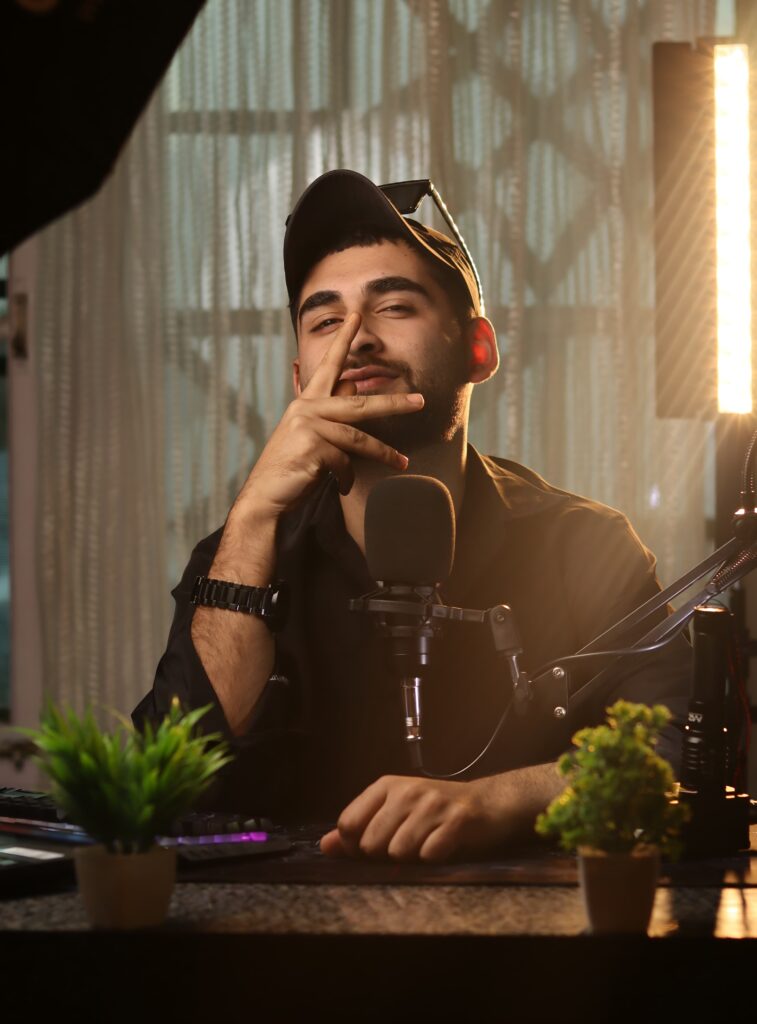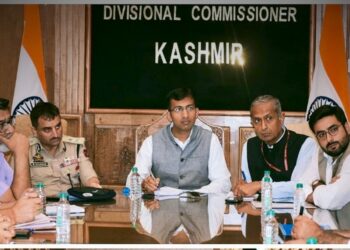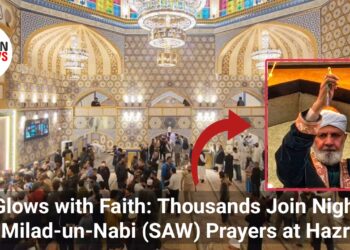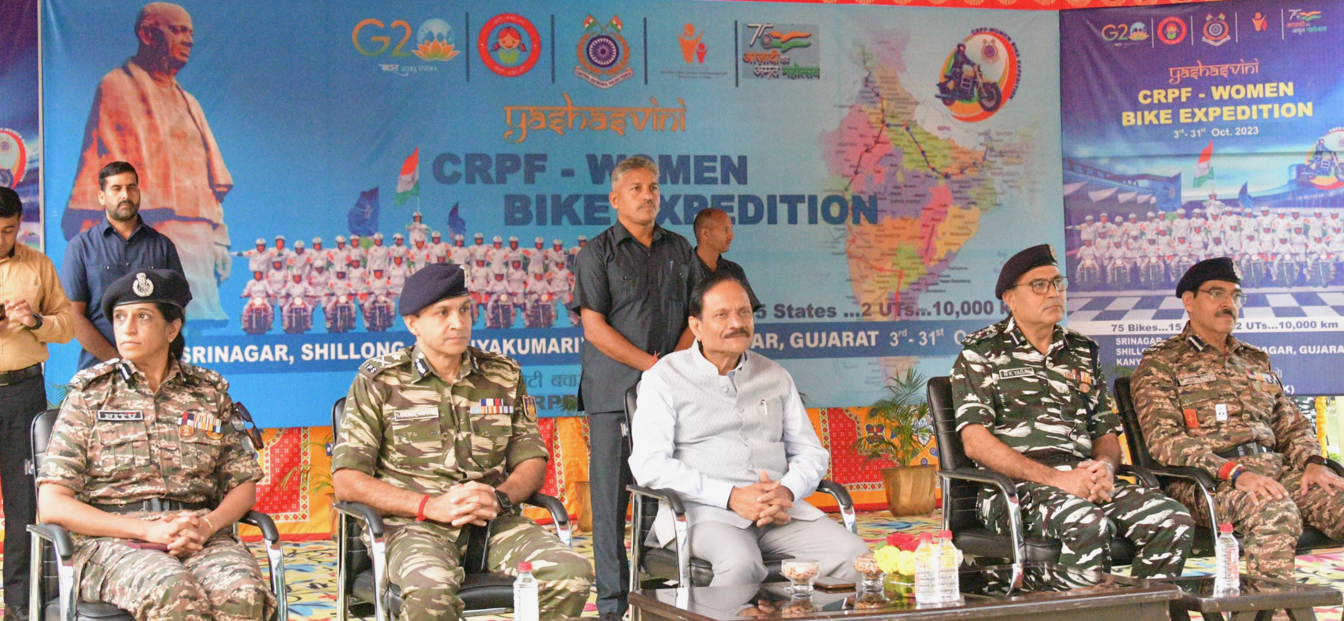
Srinagar 18 Aug (BANN ): In the early morning of Baramulla, before the sun had climbed over the Pir Panjal, Nayeem Mir opened the window of his bedroom. Outside, the streets were still, the air cool, and silence hung in the air like a companion, lingered in his mind like a distant memory.“This,” he says, gesturing toward the water, “is where I learned everything about life, the pain, the beauty, the silence. And it’s the same place I’m trying to heal, one story at a time.”It’s an ambitious mission for a 24-year-old from a small village dardpora in north Kashmir’s Baramulla district.
But then again, nothing about Nayeem’s journey has been small.The Back-Bencher with Big DreamsGrowing up in a modest household, Nayeem never imagined himself a public figure. “I was always the quiet back-bencher. Depression, anxiety, bullying they were just… part of my school life,” he says, his voice steady but his eyes betraying old wounds.At just 13, he found an outlet in writing Urdu poetry under the pen name Afnaan. His diary bore a title that seemed to sum up his adolescence: Mein Tanha (“I Am Alone”).“I would write for hours. It was the only place where I could be completely honest,” he recalls. But he also felt confined. “One day, I told a friend this place will kill my dreams. I wanted something bigger.
I wanted to see myself in a different world.”He chuckles when he admits that the first piece he ever published wasn’t a poem or a short film, but a hand-written note slipped under his cousin’s door, asking if she liked the song he had recorded. “It was awkward,” he says, “but I guess I’ve always needed feedback to keep going.”From Rap Beats to Film FramesIn 2019, he experimented with rap music, uploading his first song to YouTube under the name Axstar.
“People laughed. Friends mocked me. I didn’t care, I just had a broken phone and a dream.”The real turning point came in 2020, when he enrolled in a Multimedia and Mass Communication programme.
His early projects soon caught attention.His short film Schizophrenia – The Misunderstood, tackling mental health stigma, won first place at Sarhad’s 1st J&K International Film Festival. “That film wasn’t just for the audience; it was for the 13-year-old me who needed someone to say mental illness is real and it matters.”Next came When It’s Too Late Kashmir’s first post-apocalyptic short film, shot in public locations with special permissions. “We wanted to prove we could tell world-class stories right here, without leaving home.”By 2023, Nayeem had invested all his savings about ₹20,000 into a new project, Come Home.
Around the same time, he was also working on a documentary about child labor in Kashmir. It was during this phase that he met Anzar Bashir, who would go on to become his closest collaborator. “We just clicked,” Nayeem recalls. “Same vision, same hunger.”The Laptop Crash That Broke Him“One morning, my laptop just wouldn’t start.
Three years of my life gone in seconds,” he says. He tried everything: local technicians, online forums, even dubious offers from strangers. “I got scammed in the process. It felt like my entire journey had burned to ashes again.”He credits Anzar with pulling him back from despair. “‘Bro, let’s begin again. Nothing’s broken yet,’ he told me.
That one sentence it saved me.”At this point in our conversation, he pulls out his phone to show me a photograph not of the crashed laptop, but of an old sketchbook filled with charcoal drawings. “Not many people know this,” he says, “but before cameras and poetry, I used to draw.
That’s how I first learned to tell stories with shapes and shadows.”Life’s Next CurveballJust as he was regaining momentum, another blow came his grandmother was diagnosed with cancer. “Work didn’t matter then. Family came first,” he says. Months were spent in hospital corridors, balancing caregiving with scraps of creative work.
Somewhere in those long nights, he discovered another habit: reading travel blogs. “I’ve never been outside Kashmir,” he admits, “but I’ve visited a hundred cities in my head.
Someday, I’ll film in Istanbul, and I’ll walk the streets I’ve read about.”By mid-2024, with his grandmother stable, he and Anzar returned to work freelancing weddings, ads, and small video projects until they had saved enough to buy their first camera. “No studio, just my tiny bedroom,” Nayeem says with a smile. “But we had the fire.The Instagram LeapOn 15 February 2025, they posted their first Instagram reel. “A month later, Ramadan came. We decided 30 reels in 30 days. It was exhausting… but life-changing.”The audience responded instantly.
They hit 10,000 followers in the first month, and on August 11, their page had grown to 74,000 followers.“The numbers weren’t the point,” Nayeem says. “The messages were people saying our videos gave them hope to keep living. That’s when you realise this is not content, it’s connection.”Some of those messages came from people in villages Nayeem had never visited but one, he says, came from someone in his own school.
“They said they remembered me as the boy who never spoke in class. And now I’m the one speaking to thousands. Life’s funny like that.”Three Series, One PurposeTheir Instagram presence is now anchored by three signature series:Rooh – “For the ones who feel invisible.”Aayina – “To hold a mirror to society’s problems.”K-Town Tales – “A first-of-its-kind journey into Kashmir’s untold stories.”Each series combines cinematic visuals with storytelling that blends local culture, personal emotion, and social reflection.What’s striking is how often Nayeem weaves in details from his own life a real shop sign from his neighbourhood, a childhood game played in the alleys of Dardapora, even the smell of kangri charcoal on winter mornings.
“If I can’t make you feel Kashmir, I haven’t done my job,” he says.Beyond the ScreenNayeem’s work has made him more than a filmmaker it’s made him a lifeline for strangers. “I’ve had people tell me our videos stopped them from ending their life. You don’t forget that,” he says, his voice softening.And though few know it, he has his own ritual before filming: he listens to an old Kashmiri lullaby his grandmother used to sing.“It reminds me why I tell stories to protect memories before they vanish.”“My aim is to ensure Kashmir is remembered globally for its beauty, remarkable people, cultural legacy, rich heritage, and incredible stories. As an artist, I always try to encourage positive change in society, evolve the mentality of people, and build hope for a bright future,” he emphasized.
For him, the ultimate goal is to change how Kashmir is seen both from within and from the outside. “I want the world to remember Kashmir for its beauty, its culture, its people. Not just the headlines.”The Will to Begin AgainLooking out toward the distant Jhelum, Nayeem reflects on the arc of his journey from a lonely teenager filling a diary in Urdu verse, to a YouTube rapper, to an award-winning filmmaker with a fast-growing digital audience.“From a burned diary to a broken laptop to reaching millions the journey’s been rough,” he says. “But I’ve learned one thing: Life can erase your work, but it can’t erase your will to start again.”Beside him, Anzar grins. “And maybe it can’t erase two stubborn dreamers either.”
“My content refreshes the memories of those who left Kashmir years ago, and even people from the valley tell me they have learned something new about their own homeland,” he shares with a quiet smile.For Nayeem, these messages are the true measure of success proof that his stories are not just being watched, but are touching lives, reviving connections, and keeping the soul of Kashmir alive.And that is the real message: no matter how much loneliness, loss, or broken beginnings you face, you still carry the power to create light for others. Your story, your voice, your art whatever form it takes can touch lives, revive connections, and bring hope where it’s needed most.
If Nayeem’s journey proves anything, it’s this: you are never too small, too broken, or too late to begin again and in choosing to rise, you may become the voice of hope someone else is waiting for.



















